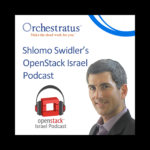Lépjen offline állapotba az Player FM alkalmazással!
OpenStack Israel Podcast, Episode 13
Manage episode 154644567 series 1129605

This podcast series explores topics of interest to OpenStack practitioners, focusing on the ecosystem in Israel.
In this episode I speak with Benny Schnaider, Chairman and co-Founder of Ravello Systems. Some highlights from the episode:
- The history of virtualization in two minutes, and why it is still important today.
- Virtualization provides separation, deployability, and mobility. What virtualization has done for VMs, Ravello is doing for collections of VMs – that is, entire applications.
- How is this different from a platform-as-a-service? IT is currently interested in infrastructure, and will continue to be for the foreseeable future. The cloud provider will always be interested in using VMs as the isolation unit between tenants, and a PaaS environment will not be uniform across providers, so IaaS will continue to be attractive from both sides of the market.
- OpenStack is interesting for Ravello because the more standardized the IaaS features are, the easier it is for us to expand our support for more cloud providers. And, we allow OpenStack developers and operators to create OpenStack deployments within the public cloud, speeding up development and testing.
- How do you keep up with what’s going on in the OpenStack ecosystem? Blogs, reading, attending events, and attending the summits, where it is important to go to meet the people.
- Docker is gaining attention – what do you think of it and similar container technologies? If you can live with the limitations of a container, then that’s great. But Ravello can run Windows VMs and other OSes, which containers cannot do.
- Ravello is used to host OpenStack and deploy it on top of a public IaaS cloud, and provides full Layer 2 networking capabilities, which containers can’t support.
- OpenStack won’t be the only IaaS solution in the future.
- The origin of the company name “Ravello.”
Shlomo Swidler’s OpenStackIL Podcast Episode 13: Benny Schnaider of Ravello Systems
![]() Subscribe to this podcast series
Subscribe to this podcast series
The post OpenStack Israel Podcast, Episode 13 appeared first on Shlomo Swidler.
10 epizódok
Manage episode 154644567 series 1129605

This podcast series explores topics of interest to OpenStack practitioners, focusing on the ecosystem in Israel.
In this episode I speak with Benny Schnaider, Chairman and co-Founder of Ravello Systems. Some highlights from the episode:
- The history of virtualization in two minutes, and why it is still important today.
- Virtualization provides separation, deployability, and mobility. What virtualization has done for VMs, Ravello is doing for collections of VMs – that is, entire applications.
- How is this different from a platform-as-a-service? IT is currently interested in infrastructure, and will continue to be for the foreseeable future. The cloud provider will always be interested in using VMs as the isolation unit between tenants, and a PaaS environment will not be uniform across providers, so IaaS will continue to be attractive from both sides of the market.
- OpenStack is interesting for Ravello because the more standardized the IaaS features are, the easier it is for us to expand our support for more cloud providers. And, we allow OpenStack developers and operators to create OpenStack deployments within the public cloud, speeding up development and testing.
- How do you keep up with what’s going on in the OpenStack ecosystem? Blogs, reading, attending events, and attending the summits, where it is important to go to meet the people.
- Docker is gaining attention – what do you think of it and similar container technologies? If you can live with the limitations of a container, then that’s great. But Ravello can run Windows VMs and other OSes, which containers cannot do.
- Ravello is used to host OpenStack and deploy it on top of a public IaaS cloud, and provides full Layer 2 networking capabilities, which containers can’t support.
- OpenStack won’t be the only IaaS solution in the future.
- The origin of the company name “Ravello.”
Shlomo Swidler’s OpenStackIL Podcast Episode 13: Benny Schnaider of Ravello Systems
![]() Subscribe to this podcast series
Subscribe to this podcast series
The post OpenStack Israel Podcast, Episode 13 appeared first on Shlomo Swidler.
10 epizódok
Minden epizód
×Üdvözlünk a Player FM-nél!
A Player FM lejátszó az internetet böngészi a kiváló minőségű podcastok után, hogy ön élvezhesse azokat. Ez a legjobb podcast-alkalmazás, Androidon, iPhone-on és a weben is működik. Jelentkezzen be az feliratkozások szinkronizálásához az eszközök között.




